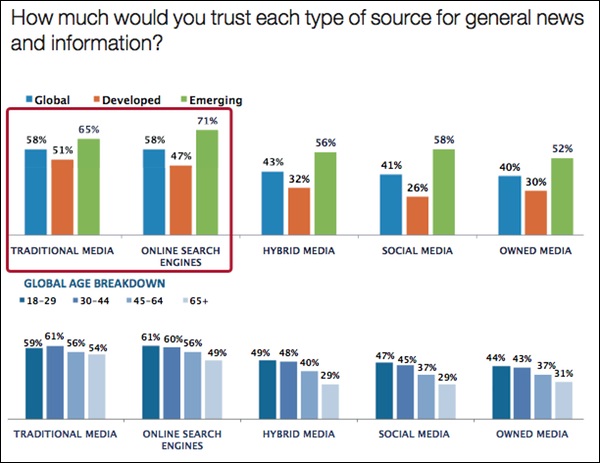Search Engines More Trusted Than Social Media For News & Information [Study]
When it comes to getting general news and information, consumers worldwide put as much trust in search engines as they do in traditional media — and more in both than they do in social media. But, the numbers don’t portray any single source as highly trusted, which suggests that consumers are at least trying to […]
 When it comes to getting general news and information, consumers worldwide put as much trust in search engines as they do in traditional media — and more in both than they do in social media.
When it comes to getting general news and information, consumers worldwide put as much trust in search engines as they do in traditional media — and more in both than they do in social media.
But, the numbers don’t portray any single source as highly trusted, which suggests that consumers are at least trying to vet the accuracy and trustworthiness of what they find in today’s information-saturated world.
The data comes from the recently released 2013 Edelman Trust Barometer, the 13th annual global survey that uses data from “informed publics” — college-educated individuals in upper income brackets that follow public policy issues and are active media users.
Trust in media, the survey says, is up five percent over last year, with search engines and traditional media topping the list: 58 percent overall said they trust those sources for news and information. Comparatively, only 41 percent of respondents said they trust social media for general news and info.
Trust is much higher in emerging countries (the green columns above), and among younger consumers (the bottom half of the chart).
(Note: “Owned media” above refers to company websites. The “Hybrid media” definition isn’t clear from the study, but appears to describe company blogs and microblog services like Twitter.)
But, with only 58 percent overall saying they trust search engines for news and information, that could be seen as a sign that Google and Bing (and others) have a long way to go in giving searchers reliable results — or maybe in convincing searchers that the results can be trusted.
Both Google and Bing seem to be trying to do just that by surfacing more reliable information, rather than just a list of links, in response to many queries. Google does it with its Knowledge Graph, while Bing has its Snapshot feature and is also offering Britannica-based information in some results.
Contributing authors are invited to create content for Search Engine Land and are chosen for their expertise and contribution to the search community. Our contributors work under the oversight of the editorial staff and contributions are checked for quality and relevance to our readers. The opinions they express are their own.
Related stories
New on Search Engine Land
